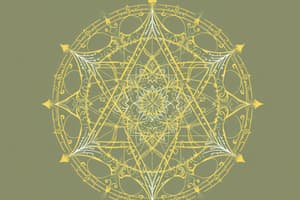Podcast
Questions and Answers
What range can angles measure?
What range can angles measure?
0° to 90°
Define a right angle.
Define a right angle.
An angle measuring exactly 90°.
What is the formula for the perimeter of a triangle?
What is the formula for the perimeter of a triangle?
Perimeter = 2(a + b) + c + d
When are two triangles considered congruent?
When are two triangles considered congruent?
What does the concept of congruency imply about two triangles?
What does the concept of congruency imply about two triangles?
What is the main focus of geometry?
What is the main focus of geometry?
What is the relationship between the diameter and the radius of a circle?
What is the relationship between the diameter and the radius of a circle?
How do circles differ from polygons in terms of their edges?
How do circles differ from polygons in terms of their edges?
What is the positioning of lines connecting centers of circles when drawn correctly?
What is the positioning of lines connecting centers of circles when drawn correctly?
How many sides do quadrilaterals have?
How many sides do quadrilaterals have?
According to common definitions in mathematics, how many consecutive pairs of sides in a quadrilateral share common endpoints?
According to common definitions in mathematics, how many consecutive pairs of sides in a quadrilateral share common endpoints?
Flashcards are hidden until you start studying
Study Notes
Geometry is a branch of mathematics dealing with shapes, sizes, positions, properties, relationships, and spaces. It's often used to solve practical problems, such as calculating the area of land needed for housing, designing buildings, etc.. Here we will focus on some key elements within geometry:
Angles
Angles represent degrees between two lines meeting at their ends, measured from one line to the other. They can range from 0° to 90°, although they don't need to be whole numbers; for instance, there might be angles measuring 75 degrees, 38 degrees, etc. Right angles measure exactly 90°, while straight ones measure zero. An angle's size determines its shape – if it's right angled or narrow, wide open, or anywhere else along this spectrum.
Triangles
A triangle consists of three sides with opposite corners connected by segments called medians or diagonals. A triangle's perimeter measures twice the sum of any two adjacent sides plus both diagonal lengths. Each side must have equal length if all four vertices form squares around them and each pair forms equilateral triangles.
Congruence of Triangles
Two triangles are said to be congruent when their corresponding parts have the same measurements. This means that two triangles could look alike without being identical – their proportions match perfectly even though they aren't necessarily made up of precisely similar lines. For example, you might draw two equilateral triangles using different pencils. Even so, these would still count as congruent because every part has been proportioned identically.
Circles
Circles consist of points lying on a fixed center point. Unlike polygons, where sides meet at sharp angles, circles always show rounded edges which makes them appear smooth. The diameter of circle equals half its radius. When drawn correctly, lines connecting centers lie outside any other given line passing through those points.
Quadrilaterals
Quadrilaterals consist of four sides joined together into a single unit. These can take various shapes including squares rectangles, parallelograms etc., depending upon how their sides connect to create distinctive features. In general terms, only two consecutive pairs of sides share common endpoints according to definitions used commonly among mathematicians today.
Studying That Suits You
Use AI to generate personalized quizzes and flashcards to suit your learning preferences.




